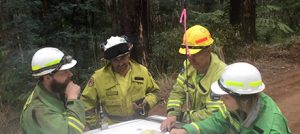Improving natural disaster managements across all levels of government is expected to be one of the major focus points for the Royal Commission into the devastating bushfire confirmed by the Prime Minister Scott Morrison yesterday. Source: Timberbiz
And the Australian Forest Products Association has applauded the inclusion of hazard reduction as one of the commission’s priorities.
The terms of reference include “preparedness and resilience responsibilities, which includes land management and hazard reduction measures”.
Former Australian Defence Forces chief Mark Biskin had already been announced as the commissioner and he will be joined by former Federal Court judge Annabelle Bennett and leading environmental lawyer Andrew McIntosh.
AFPA CEO Ross Hampton has reiterated that hazard reduction must encompass a whole-of-landscape fuel reduction approach, including the use of mechanical techniques to complement winter burn offs.
“The Royal Commission’s Terms of Reference give it the authority to investigate and recommend ways of limiting the impact of future bushfires, and Mechanical Fuel Reduction has proved highly effective in other bushfire prone countries,” he said.
‘It’s clear that a business-as-usual approach in our forests is not an option anymore, and this announcement of the terms of reference is great news.
“This terrible fire season has exposed the fact that we have multiple approaches by multiple land managers and agencies when it comes to fuel load reduction,” he said.
“With the best will in the world this is not a recipe for success.”
Multiple use State Forests only made up about 8% of the 132 million hectares of native forest. Forestry areas had road networks and men and women with heavy machinery able to put fires out before they got too large.
But Mr Hampton said that forestry areas were the smallest part of the native forest area. “We need a new approach to reducing fuel loads across all our forest tenures to mitigate against devastating fires,” he said.
“Farmers too need permission to actively manage for bushfire mitigation. With State governments generally falling behind recommended prescribed burning targets, it is time to add to the mix the internationally proven technique of mechanical fuel reduction, to better fire-proof key assets, regional towns, farms and livelihoods.”
Mr Morrison said the scale of the Black Summer bushfires presented new challenges for all levels of government, which required a detailed national inquiry.
“My priority is to keep Australians safe and to do that, we need to learn from the Black Summer bushfires how nationally we can work better with the states and territories to better protect and equip Australians for living in hotter, drier and longer summers,” the Prime Minister said.
“In particular, we need to consider the need to establish new powers for the Federal Government to declare a national state of emergency to trigger direct Federal Government responses to national disasters, including the direct deployment of the Australian Defence Force. Currently, there are no such powers and Federal responses are supposed to only be undertaken in response to State requests and authorisations.
“During the Black Summer bushfires, we entered a constitutional grey zone by directly initiating defence force deployments, utilising the first ever compulsory call out of Reservists, with over 6,500 ADF personnel serving in support of state and territory response efforts. But we did that without clear rules.”
The inquiry acknowledged climate change, the broader impact of Australia’s summers getting longer, drier and hotter and would be focussed on practical action that has a direct link to making Australians safer.
“The overwhelming majority of the actions to protect Australians from bushfires are undertaken at a State level. Everything from resourcing our fire services and hazard reduction, to land clearing and planning laws,” Mr Morrison said.
“Even the declaration of emergencies, the areas that are designated to receive payments and in most cases the assessment and delivery of those payments, even when they are funded by the Federal Government, are all undertaken by the States.
“I believe Australians are wanting us to look at ways we can work together to give Australians greater assurances at a national level that these important tasks are getting done.
“I want the Royal Commission to begin as soon as possible with the final report due back by August 31, so recommendations can be acted upon before our next bushfire season.”
The Royal Commission is not going to duplicate the work of other inquiries. It will work with other inquiries announced by the States and it will also review the work and recommendations of previous inquiries.
Mr Hampton said Australia could not afford a repeat of the summer we have just experienced, and all effective ways of reducing risk must be considered.
“That’s what mechanical fuel reduction is and this is what we will be seeking to discuss with the Royal Commissioners.”
The Terms of Reference can be found at https://www.pm.gov.au/sites/default/files/files/tor-nat-royal-commission-black-summer-bushfires.pdf






